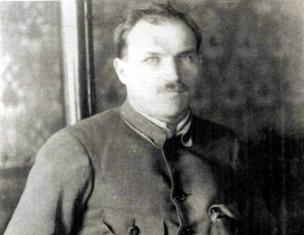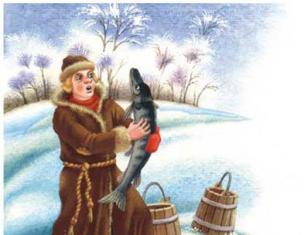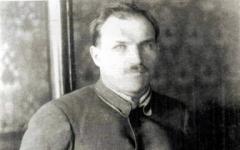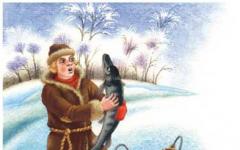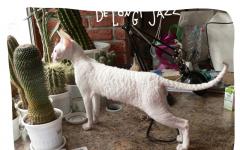Many of his poetic masterpieces are shrouded in a certain haze of mystery and mystery, which does not bother the author in simple words talk to the reader, share experiences and invest a piece of your own soul. This is exactly what the poem “Stranger” is.
“The Stranger” is one of the most famous and recognizable works of Blok’s work.
In the evenings above the restaurants
The hot air is wild and deaf,
And rules with drunken shouts
Spring and pernicious spirit.
Far above the dust of the alley,
Above the boredom of country dachas,
The bakery's pretzel is slightly golden,
And a child's cry is heard.
And every evening, behind the barriers,
Breaking the pots,
Walking with the ladies among the ditches
Tested wits.
Oarlocks creak over the lake
And a woman's squeal is heard,
And in the sky, accustomed to everything
The disk is bent senselessly.
And every evening my only friend
Reflected in my glass
And tart and mysterious moisture
Like me, humbled and stunned.
And next to the neighboring tables
Sleepy lackeys hang around,
And drunkards with rabbit eyes
“In vino veritas!”1 they shout.
And every evening, at the appointed hour
(Or am I just dreaming?),
The girl's figure, captured by silks,
A window moves through a foggy window.
And slowly, walking between the drunks,
Always without companions, alone
Breathing spirits and mists,
She sits by the window.
And they breathe ancient beliefs
Her elastic silks
And a hat with mourning feathers,
And in the rings there is a narrow hand.
And chained by a strange intimacy,
I look behind the dark veil,
And I see the enchanted shore
And the enchanted distance.
Silent secrets have been entrusted to me,
Someone's sun was handed to me,
And all the souls of my bend
Tart wine pierced.
And ostrich feathers bowed
My brain is swinging,
And blue bottomless eyes
They bloom on the far shore.
There's a treasure in my soul
And the key is entrusted only to me!
You're right, drunken monster!
I know: the truth is in the wine.
How the poem came about

According to the memoirs of contemporaries, life famous poet in 1906 it was subordinated to some strange regime. Vladimir Piast, a poet, said that experiencing the personal drama of separation from his wife, Blok felt very depressed. Although there was nothing strange in the daily routine. Alexander Alexandrovich got up at the same time, demanded lunch, and then went for a walk. Most often, Blok walked along the outskirts of St. Petersburg, where he observed everything that was happening around him. He could have wandered into some restaurant. And I must say frankly, I touched the bottle more often than was permissible. The poet especially liked one of the establishments. He went there regularly.
The establishment was not elite and was more like a tavern. But here the romantic was able to see some kind of mystery. He calmly settled down in a cheap drinking establishment and spent hours searching "oblivion in wine."
Alexander himself argued that he needed new impressions that would fill him new energy, and he would be able to work on his unusual works again. And for this, perhaps he will even have to sink to the very bottom of this terrible life. But he will have the necessary life experience, which he can then use in his poetry.
 Constantly visiting this restaurant, the poet even got his own place from which he could observe what was happening. Here he saw a woman who brought with her a touch of mystery. This stranger did not resemble anything around her, and rather resembled gem caught in the dust. The atmosphere of a tavern did not suit her. Exquisite clothes and manners - everything marked her as an aristocrat. It seemed that her appearance was completely out of place in this restaurant.
Constantly visiting this restaurant, the poet even got his own place from which he could observe what was happening. Here he saw a woman who brought with her a touch of mystery. This stranger did not resemble anything around her, and rather resembled gem caught in the dust. The atmosphere of a tavern did not suit her. Exquisite clothes and manners - everything marked her as an aristocrat. It seemed that her appearance was completely out of place in this restaurant.
The appearance of a stranger who was apparently worried heartache, made a great impression on Blok. This woman seemed very strong personality able to cope with life's difficulties own internal forces, and not with the help of wine.
Admiring the girl, her endurance and self-control, the lyricist and romantic Blok wrote this textbook work.
The time of action is spring. Blok could not help but describe the situation taking place around the twisting plot.
A little boring in the suburban dacha area. In the evenings, couples walk, some settle down in restaurants, somewhere you can hear a child crying - nothing special happens.
This is where our hero spends his time, in a small tavern, which does not shine with its guests, but rather the opposite. Among the ordinary visitors there are also those who have sunk to the very bottom of life: drunkards, gigolos, prostitutes. But even in this vulgar setting, our hero finds something romantic.
 This is where the stranger appears, who is always alone, without any accompaniment. She comes at the same time. And even the same table is occupied by the same one, passing between drunken visitors.
This is where the stranger appears, who is always alone, without any accompaniment. She comes at the same time. And even the same table is occupied by the same one, passing between drunken visitors.
A rather tipsy poet draws attention to her. A girl, clearly of noble birth, occupies his thoughts. The romantic sets off on a voyage to the “charming distance”, trying to unravel the incomprehensible feminine mystery.
 Reflecting on a life unknown, but so beautiful, exquisitely dressed and with good manners girls, the lyricist begins to analyze his own life. He has an epiphany. He understands that troubles, tragic events, and grief can happen in the life of any person, but you need to find the strength within yourself to withstand life’s adversities. Don't go to the bottom. There is no point in drunkenness and inactivity. It all depends on the victim himself. Either he gives up and does not want to fight, or he remains true to his principles and ideals. He says, “The key is entrusted only to me!”
Reflecting on a life unknown, but so beautiful, exquisitely dressed and with good manners girls, the lyricist begins to analyze his own life. He has an epiphany. He understands that troubles, tragic events, and grief can happen in the life of any person, but you need to find the strength within yourself to withstand life’s adversities. Don't go to the bottom. There is no point in drunkenness and inactivity. It all depends on the victim himself. Either he gives up and does not want to fight, or he remains true to his principles and ideals. He says, “The key is entrusted only to me!”
Literary roll call

Researchers of the work of Alexander Blok say that between the work “Stranger” and various jobs other classics, invisible literary threads can be drawn.
For example, Gogol’s story “Nevsky Prospekt”, when main character, the artist Piskarev, ends up in a shelter where vulgarity and debauchery reign.
The charm of mystery can be found in the poems of Pushkin, Lermontov, Tyutchev.
Writers recall V. Bryusov’s poem “A Passerby,” where the heroine also appears from the “darkness of the spirits,” and the drunken author drowns in vicious sensations.
In his work, Blok did not hesitate to describe in detail the drinking establishment, the image of the glorious woman, and his attitude towards her. The work does not look “dirty”. On the contrary, the pure image of the girl made the main character cleaner. Everything came together in this poem, which is why the reader fell in love with it.
Expressive means

Some researchers called Blok's poem a ballad. This is, of course, not true. The poem has neither fantasy nor an epic plot.
The poem “Stranger” can be divided into three parts. The first, telling about the ordinary life of the poet, about the boredom that reigned in holiday village. The second is about a beautiful, sophisticated stranger. The third is about the conclusions made by the main character.
For a better contrast, on which the entire text is built, the author uses various means:
✔Epithets.
✔Metaphor.
✔Comparisons.
✔Avatars.
Many critics of that time, trying to analyze this poem, noticed that it was very musical.
Critical evaluation of the work

Initially, any reviews and reviews of Blok’s poem “Stranger” did not come from critics in the most forest-like manner. Many have noticed that the plot is not new, there is little dynamics in it. Some even called storyline drunken hallucination.
But the exciting work attracted me with its melodiousness, truthfulness and mystery. The reader was able to grasp all the beauty perfectly in this vulgar and vulgar world. The desire to get rid of vices and give up drunkenness in favor of a life that can give pleasure without the help of wine creates a positive image of both the main character and the beautiful stranger.
It is known that this real meeting made a great impression on Alexander Alexandrovich. He seriously thought about his life and, thanks to his thoughts, was able to get out of the depression in which he was at that moment.
It is not surprising that the juxtaposition of the sinful and vulgar world with the beautiful, tender and airy feelings conveyed by the author makes the reader think not only about the characters, but also about his own life. This is the highest purpose of poetry.
In the evenings above the restaurants
The hot air is wild and deaf,
And rules with drunken shouts
Spring and pernicious spirit.
Far above the dust of the alley,
Above the boredom of country dachas,
The bakery's pretzel is slightly golden,
And a child's cry is heard.
And every evening, behind the barriers,
Breaking the pots,
Walking with the ladies among the ditches
Tested wits.
Oarlocks creak over the lake
And a woman's squeal is heard,
And in the sky, accustomed to everything
The disk is bent senselessly.
And every evening my only friend
Reflected in my glass
And tart and mysterious moisture
Like me, humbled and stunned.
And next to the neighboring tables
Sleepy lackeys hang around,
And drunkards with rabbit eyes
“In vino veritas!”* they shout.
And every evening, at the appointed hour
(Or am I just dreaming?),
The girl's figure, captured by silks,
A window moves through a foggy window.
And slowly, walking between the drunks,
Always without companions, alone
Breathing spirits and mists,
She sits by the window.
And they breathe ancient beliefs
Her elastic silks
And a hat with mourning feathers,
And in the rings there is a narrow hand.
And chained by a strange intimacy,
I look behind the dark veil,
And I see the enchanted shore
And the enchanted distance.
Silent secrets have been entrusted to me,
Someone's sun was handed to me,
And all the souls of my bend
Tart wine pierced.
And ostrich feathers bowed
My brain is swinging,
And blue bottomless eyes
They bloom on the far shore.
There's a treasure in my soul
And the key is entrusted only to me!
You're right, drunken monster!
I know: the truth is in the wine.
* In vino veritas! - The truth is in the wine! (lat.)
Analysis of the poem “Stranger” by Alexander Blok
To understand the meaning of the poem “Stranger,” you need to know the history of its creation. Blok wrote it in 1906 during a difficult period when his wife left him. The poet was simply crushed by despair and spent whole days binge drinking in dirty, cheap establishments. Blok's life was going downhill. He was well aware of this, but could not fix anything. His wife’s betrayal put an end to all the poet’s hopes and aspirations. He has lost the purpose and meaning of his existence.
The poem begins with a description of the situation in which the lyrical hero now finds himself. He had long been accustomed to the gloomy atmosphere of dirty restaurants. The author is constantly surrounded by drunk people. Nothing changes around, it drives you crazy with its monotony and meaninglessness. Even the source of poetic inspiration, the moon, is just “a disk accustomed to everything.”
In this situation, hope for deliverance comes to the lyrical hero in the form of a mysterious stranger. It is not clear from the poem whether this woman is real, or just a figment of the imagination, distorted by the constant consumption of wine. At the same time, the stranger passes between the drunken rows and takes her place by the window. She is a creature from another, pure and bright world. Looking at her majestic appearance, smelling the perfume, the author understands the abomination of his situation. In his dreams, he flies away from this stuffy room and begins a completely new life.
The ending of the poem is ambiguous. The conclusion to which the author comes (“The truth is in wine!”) can be interpreted in two ways. On the one hand, Blok was not like the drunkards around him, who had completely lost hope for the future. He realized that he continued to keep a spiritual “treasure” that he had the right to dispose of. On the other hand, seeing a stranger and awakening faith in the best may simply be drunken delirium, followed by a severe hangover.
The poem is written in figurative language. Epithets reflect the author’s spiritual emptiness (“pernicious”, “meaningless”, “sleepy”). The gloominess of the situation is enhanced by metaphors (“tart and mysterious moisture”, “with the eyes of rabbits”) and personifications (“ruled by... a corruptive spirit”).
The description of the stranger provides a sharp contrast to the dirty restaurant. The author highlights only individual details that have symbolic meaning for him (“elastic silk”, “narrow hand”). The fleeting nature of the image emphasizes the unreality of what is happening. In the author's mind, the line between dream and reality is blurred.
The poem “Stranger” occupies a special place in Blok’s work. It reflects the author’s sincere feelings and thoughts during a period of acute mental and life crisis. An attempt has been made to find a way out of this disastrous situation.
Alexander Blok wrote the poem “Stranger” in 1906, but the poems saw the light of day at the end of 1908, when they were included in the “City” cycle. The poet continues the series lyric poems, but shows the stranger of his dreams not divorced from life, but against the backdrop of the surrounding world, mixing a bouquet of philosophy into the poem.
Let's pay attention to one more move by Block. The lady is always alone and wears a hat with mourning feathers. Perhaps the author shows the beauty’s recent grief and her renunciation of the world, at least for today. Thus, the image moves from the category of a living stranger to the category of a dream.
The poet concludes in a doubly interesting way - he places himself in the category of drunkards, and refuses the stranger, preferring wine. He hides it under the key, renouncing beauty in favor of the search for truth; wine is only a metaphor, nothing more. A stranger remained in my dreams, and a glass of wine on the table - a combination of spiritual and material.
In the evenings above the restaurants
The hot air is wild and deaf,
And rules with drunken shouts
Spring and pernicious spirit.
Far above the dust of the alley,
Above the boredom of country dachas,
The bakery's pretzel is slightly golden,
And a child's cry is heard.
And every evening, behind the barriers,
Breaking the pots,
Walking with the ladies among the ditches
Tested wits.
Oarlocks creak over the lake
And a woman's squeal is heard,
And in the sky, accustomed to everything
The disk is bent senselessly.
And every evening my only friend
Reflected in my glass
And tart and mysterious moisture
Like me, humbled and stunned.
And next to the neighboring tables
Sleepy lackeys hang around,
And drunkards with rabbit eyes
“In vino veritas!” they scream.
And every evening, at the appointed hour
(Or am I just dreaming?),
The girl's figure, captured by silks,
A window moves through a foggy window.
And slowly, walking between the drunks,
Always without companions, alone
Breathing spirits and mists,
She sits by the window.
And they breathe ancient beliefs
Her elastic silks
And a hat with mourning feathers,
And in the rings there is a narrow hand.
And chained by a strange intimacy,
I look behind the dark veil,
And I see the enchanted shore
And the enchanted distance.
Silent secrets have been entrusted to me,
Someone's sun was handed to me,
And all the souls of my bend
Tart wine pierced.
And ostrich feathers bowed
My brain is swinging,
And blue bottomless eyes
They bloom on the far shore.
There's a treasure in my soul
And the key is entrusted only to me!
You're right, drunken monster!
I know: the truth is in the wine.
In the evenings above the restaurants
The hot air is wild and deaf,
And rules with drunken shouts
Spring and pernicious spirit.
Far above the dust of the alley,
Above the boredom of country dachas,
The bakery's pretzel is slightly golden,
And a child's cry is heard.
And every evening, behind the barriers,
Breaking the pots,
Walking with the ladies among the ditches
Tested wits.
Oarlocks creak over the lake
And a woman's squeal is heard,
And in the sky, accustomed to everything
The disk is bent senselessly.
And every evening my only friend
Reflected in my glass
And tart and mysterious moisture
Like me, humbled and stunned.
And next to the neighboring tables
Sleepy lackeys hang around,
And drunkards with rabbit eyes
“In vino veritas!”* they shout.
And every evening, at the appointed hour
(Or am I just dreaming?),
The girl's figure, captured by silks,
A window moves through a foggy window.
And slowly, walking between the drunks,
Always without companions, alone
Breathing spirits and mists,
She sits by the window.
And they breathe ancient beliefs
Her elastic silks
And a hat with mourning feathers,
And in the rings there is a narrow hand.
And chained by a strange intimacy,
I look behind the dark veil,
And I see the enchanted shore
And the enchanted distance.
Silent secrets have been entrusted to me,
Someone's sun was handed to me,
And all the souls of my bend
Tart wine pierced.
And ostrich feathers bowed
My brain is swinging,
And blue bottomless eyes
They bloom on the far shore.
There's a treasure in my soul
And the key is entrusted only to me!
You're right, drunken monster!
I know: the truth is in the wine.
* In vino veritas! - The truth is in the wine! (lat.)
Analysis of the poem “Stranger” by Alexander Blok
To understand the meaning of the poem “Stranger,” you need to know the history of its creation. Blok wrote it in 1906 during a difficult period when his wife left him. The poet was simply crushed by despair and spent whole days binge drinking in dirty, cheap establishments. Blok's life was going downhill. He was well aware of this, but could not fix anything. His wife’s betrayal put an end to all the poet’s hopes and aspirations. He has lost the purpose and meaning of his existence.
The poem begins with a description of the situation in which the lyrical hero now finds himself. He had long been accustomed to the gloomy atmosphere of dirty restaurants. The author is constantly surrounded by drunk people. Nothing changes around, it drives you crazy with its monotony and meaninglessness. Even the source of poetic inspiration, the moon, is just “a disk accustomed to everything.”
In this situation, hope for deliverance comes to the lyrical hero in the form of a mysterious stranger. It is not clear from the poem whether this woman is real, or just a figment of the imagination, distorted by the constant consumption of wine. At the same time, the stranger passes between the drunken rows and takes her place by the window. She is a creature from another, pure and bright world. Looking at her majestic appearance, smelling the perfume, the author understands the abomination of his situation. In his dreams, he flies away from this stuffy room and begins a completely new life.
The ending of the poem is ambiguous. The conclusion to which the author comes (“The truth is in wine!”) can be interpreted in two ways. On the one hand, Blok was not like the drunkards around him, who had completely lost hope for the future. He realized that he continued to keep a spiritual “treasure” that he had the right to dispose of. On the other hand, seeing a stranger and awakening faith in the best may simply be drunken delirium, followed by a severe hangover.
The poem is written in figurative language. Epithets reflect the author’s spiritual emptiness (“pernicious”, “meaningless”, “sleepy”). The gloominess of the situation is enhanced by metaphors (“tart and mysterious moisture”, “with the eyes of rabbits”) and personifications (“ruled by... a corruptive spirit”).
The description of the stranger provides a sharp contrast to the dirty restaurant. The author highlights only individual details that have symbolic meaning for him (“elastic silk”, “narrow hand”). The fleeting nature of the image emphasizes the unreality of what is happening. In the author's mind, the line between dream and reality is blurred.
The poem “Stranger” occupies a special place in Blok’s work. It reflects the author’s sincere feelings and thoughts during a period of acute mental and life crisis. An attempt has been made to find a way out of this disastrous situation.
Reading the poem “Stranger” by Alexander Alexandrovich Blok in class and at home online is necessary with an understanding of two important facts. The first is that in it the poet expressed his worldview, embodying in the image of a stranger in silk what is so sorely lacking in the world - romance, beauty and love. The second is that this is a classic example of symbolic poetry (the poem was written in 1906), requiring appropriate reading.
The work is divided into two parts. Its first half is actually one metaphor, expanded into several stanzas - it shows the vulgarity and hopelessness of everyday life. And now beauty enters the dreary atmosphere, embodied in a woman breathing perfume and mists. The text of Blok’s poem “Stranger” shows a bifurcated reality, the gap between reality and dreams lyrical hero. But in fact, if you read it in its entirety in a literature class or at home, it is easy to see that hope is embodied in the image of the stranger.
The lyrical hero, who has high feelings for that unearthly woman who appears before him, understands that his life is not so disgusting, that the lost faith in goodness is returning. This poem needs to be learned in order to feel all the vibrations of the poet’s tender nature and his joy from meeting a miracle.
In the evenings above the restaurants
The hot air is wild and deaf,
And rules with drunken shouts
Spring and pernicious spirit.
Far above the dust of the alley,
Above the boredom of country dachas,
The bakery's pretzel is slightly golden,
And a child's cry is heard.
And every evening, behind the barriers,
Breaking the pots,
Walking with the ladies among the ditches
Tested wits.
Oarlocks creak over the lake
And a woman's squeal is heard,
And in the sky, accustomed to everything
The disk is bent senselessly.
And every evening my only friend
Reflected in my glass
And tart and mysterious moisture
Like me, humbled and stunned.
And next to the neighboring tables
Sleepy lackeys hang around,
And drunkards with rabbit eyes
“In vino veritas!”* they shout.
And every evening, at the appointed hour
(Or am I just dreaming?),
The girl's figure, captured by silks,
A window moves through a foggy window.
And slowly, walking between the drunks,
Always without companions, alone
Breathing spirits and mists,
She sits by the window.
And they breathe ancient beliefs
Her elastic silks
And a hat with mourning feathers,
And in the rings there is a narrow hand.
And chained by a strange intimacy,
I look behind the dark veil,
And I see the enchanted shore
And the enchanted distance.
Silent secrets have been entrusted to me,
Someone's sun was handed to me,
And all the souls of my bend
Tart wine pierced.
And ostrich feathers bowed
My brain is swinging,
And blue bottomless eyes
They bloom on the far shore.
There's a treasure in my soul
And the key is entrusted only to me!
You're right, drunken monster!
I know: the truth is in the wine.

